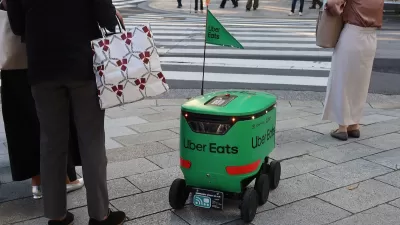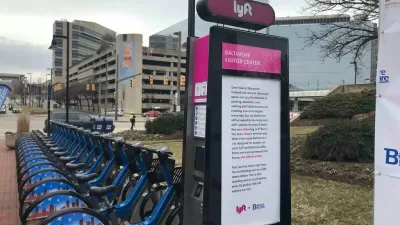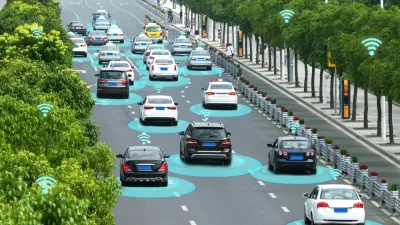Contrary to one some urbanists believe, some of the advancements of the new economy might better serve less dense, even suburban, environments. Example: a delivery robot created by the co-founders of Skype.
John Markoff provides a dispatch from the front lines of the automated economy in Menlo Park, California, where entrepreneurs he recently witnessed the debut of a robot capable of autonomous navigation, designed to solve the "last mile" problem familiar to planners: "getting goods like groceries, drugstore items and most small packages to suburban homes."
As self-driving cars and delivery services continue their quick ascent in the popular consciousness, products like this robot created by Starship Technologies with finding from Skype co-founders Ahti Heinla and Janus Friis, could join the two in futuristic synchronicity.
"Their task is simpler than the one facing designers of self-driving cars, because if something goes wrong, the Starship robot is much less likely to cause harm. While Amazon and Google are pursuing the idea of using airborne drones to deliver packages in urban areas, Mr. Heinla, who serves as the chief technology officer for Starship, believes his ground-based approach is more practical."
Markoff's explanation of the business model that rides on the success of this robot includes one critical distinction: "The system is not intended for crowded urban environments….Rather it is targeted for relatively affluent and uncrowded suburban neighborhoods, gated communities, assisted living facilities and campuses, where it will travel on sidewalks, programmed to mingle freely with pedestrians, bicyclists and cars."
FULL STORY: Skype Founders Build a Robot for Suburban Streets

Planetizen Federal Action Tracker
A weekly monitor of how Trump’s orders and actions are impacting planners and planning in America.

San Francisco's School District Spent $105M To Build Affordable Housing for Teachers — And That's Just the Beginning
SFUSD joins a growing list of school districts using their land holdings to address housing affordability challenges faced by their own employees.

The Tiny, Adorable $7,000 Car Turning Japan Onto EVs
The single seat Mibot charges from a regular plug as quickly as an iPad, and is about half the price of an average EV.

Seattle's Plan for Adopting Driverless Cars
Equity, safety, accessibility and affordability are front of mind as the city prepares for robotaxis and other autonomous vehicles.

As Trump Phases Out FEMA, Is It Time to Flee the Floodplains?
With less federal funding available for disaster relief efforts, the need to relocate at-risk communities is more urgent than ever.

With Protected Lanes, 460% More People Commute by Bike
For those needing more ammo, more data proving what we already knew is here.
Urban Design for Planners 1: Software Tools
This six-course series explores essential urban design concepts using open source software and equips planners with the tools they need to participate fully in the urban design process.
Planning for Universal Design
Learn the tools for implementing Universal Design in planning regulations.
Smith Gee Studio
City of Charlotte
City of Camden Redevelopment Agency
City of Astoria
Transportation Research & Education Center (TREC) at Portland State University
US High Speed Rail Association
City of Camden Redevelopment Agency
Municipality of Princeton (NJ)





























